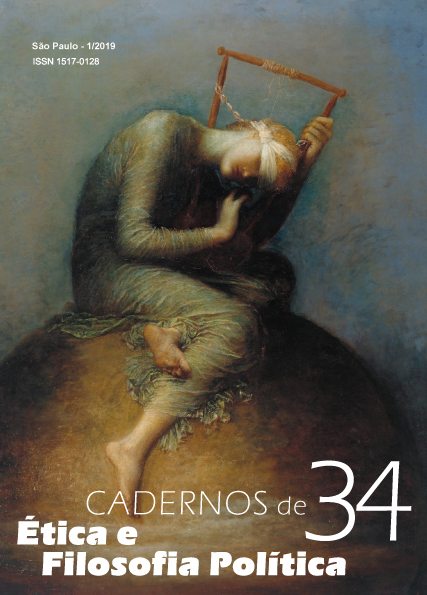A perfectibilidade segundo Rousseau
DOI:
https://doi.org/10.11606/issn.1517-0128.v1i34p132-142Keywords:
Rousseau, Perfectibilidade, Humanidade, AnimalidadeAbstract
The man in the pure state of nature begins his existence “with purely animal functions”. In the first part of his Discourse on Inequality, as a matter of fact, Rousseau's effort consists in almost “animalizing” the human being, making him incapable of performing certain types of operations that the social or socialized man (endowed with an already developed mental apparatus) can do. However, although animalized, man maintains his own dignity and unique nature. The author never reduces the human behaviour to the animal. The aim of this article is to investigate the character of such a unique nature and to show that, against some interpreters, perfectibility (a sign of human distinction) already acts in the pure state of nature. In this sense, we cannot consider it as mere virtuality or as a potential faculty.
Downloads
References
AROLES, Serge. L’Enigme des enfants-loups. Paris: Publibook, 2007.
BEYSSADE, Jean-Marie. “Rousseau et la pensée du développement: Facultés virtuelles et développement”. In: Entre forme et histoire: la formation de la notion de développement à l’âge classique. Présentation par Olivier Bloch, Bernard Balan et Paulette Carrire. Paris: Méridiens-Klincksieck, 1988.
BUFFON. OEuvres. Bibliothèque de la Pléiade. Paris: Gallimard, 2007.
DERRIDA, Jacques. De la Grammatologie. Paris: Éditions de Minuit, 1967.
DUCHEZ, Marie-Elisabeth. “Principe de la Mélodie et Origine des langues: un brouillon inédit de Jean-Jacques Rousseau sur l’origine de la mélodie”. In: Revue de musicologie. Paris, 1974, Tome LX, n.1-2, pp. 33-86.
GOLDSCHMIDT, Victor. Anthropologie et politique: les principes du système de Rousseau. Paris: Librairie philosophique J. Vrin, 1983.
GUICHET, Jean-Luc. Rousseau: l’animal et l’homme: L’animalité dans l’horizon anthropologique des Lumières. Paris: Les Éditions du Cerf, 2006.
LA METTRIE, Julien Offroy de. L’homme-Machine. Paris: Éditions Denoël/Gonthier, 1981.
MALSON, Lucien. Les enfants sauvages: Mythe et réalité; suivi de Mémoire et rapport sur Victor de l’Aveyron par Jean Itard. Paris: Éditions 10/18, 1964.
MASTERS, Roger. The Political Philosophy of Rousseau. Princeton: Princeton University Press, 1968.
MONTAIGNE. Essais. Tome I. Paris: GF Flammarion, 1969.
RADICA, Gabrielle. L’histoire de la raison: anthropologie, morale et politique chez Rousseau. Paris: H. Champion, 2008.
ROBERT, Thomas. “Rousseau et les Pongos”. Revue de primatologie [En ligne], 4, 2012, document 3, mis en ligne le 15 décembre 2012, Consulté le 25 novembre 2015. URL: http://primatologie.revues.org/1009.
ROUSSEAU. Du Principe de la mélodie. In: Wokler, Robert. Rousseau on society, politics, music and language [Texte imprimé]: an historical interpretation of his early writings. New York: Garland, 1987, pp. 436-482.
ROUSSEAU. OEuvres Complètes de Jean-Jacques Rousseau. Ed. Bernard Gagnebin e Marcel Raymond. Paris: Gallimard, 1959-1995. 5 volumes. (Col. Bibliothèque de la Pléiade).
STAROBINSKI, Jean. Jean-Jacques Rousseau: a transparência e o obstáculo, seguido de sete ensaios sobre Rousseau. São Paulo: Companhia das Letras, 1991.
STRIVAY, Lucienne. Enfants sauvages: approches anthropologiques. Paris: Éditions Gallimard, 2006.
Downloads
Published
Issue
Section
License
Copyright (c) 2019 Mauro Dela Bandera Arco Júnior

This work is licensed under a Creative Commons Attribution-ShareAlike 4.0 International License.


